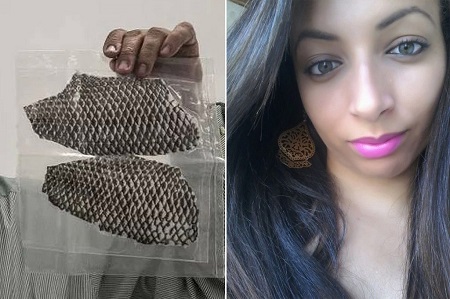
A Brazilian woman, born without a vagina, has become the first in the world to undergo pioneering reconstructive surgery that successfully created a new vaginal canal using the skin of tilapia fish.
Researchers at the Federal University of Ceara (UFC) in northeast Brazil, led by gynecologist Dr. Leonardo Bezerra, revealed the unprecedented procedure, called a neovaginoplasty, was performed on Jucilene Marinho, 23, in April 2017.
The unorthodox treatment is faster, cheaper and less aggressive than the conventional method used for sufferers of Mayer-Rokitansky-Küster-Hauser (MRKH), a rare congenital disorder that affects approximately one in 5,000 newborn girls and results in the absence of some or all of the female reproductive organs. The revolutionary treatment involves opening a space between the vagina and anus and inserting a tubular mold lined with the skin of the freshwater fish.
Once in contact with the patient’s body, tilapia skin acts like stem cells and is absorbed and transformed into cellular tissue forming the walls of the canal, similar to that of an actual vagina. Before being used, the fish skin undergoes a special cleaning and sterilization process in the lab followed by irradiation to kill viruses. The process removes all the scales and fish smell and results in a light-colored gel dressing that can be stored for up to two years in refrigerated sterile packaging. An ecstatic Marinho spoke for the first time to FocusOn News about how the ground-breaking surgery has changed her life and made her feel like “a proper woman” who now enjoys a healthy life. The young university student from Lavras da Mangabeira was diagnosed in her teens with having no cervix, uterus, ovaries or womb. However, to doctors’ surprise, she developed normally throughout puberty and even experienced menstrual cramping pains in her stomach but never had a period.
At the age of 15 she was given the crushing news there was nothing but connective tissue behind the skin blocking the opening of her vagina. “I cried a lot when I found out,” she recalled. “I thought my world had ended. I’d always dreamed of having a baby of my own now I had to accept that wouldn’t be possible.” She spiraled into a deep depression fearing she would never experience an intimate and loving relationship. This worsened when a teenage boyfriend mocked and broke up with her after discovering the disorder. But last year, six months after agreeing to become the first of four women to have the experimental procedure, Marinho had for the first time in her life with her partner Marcus Santos, 24, who she has been with for over a year and who has supported her throughout.